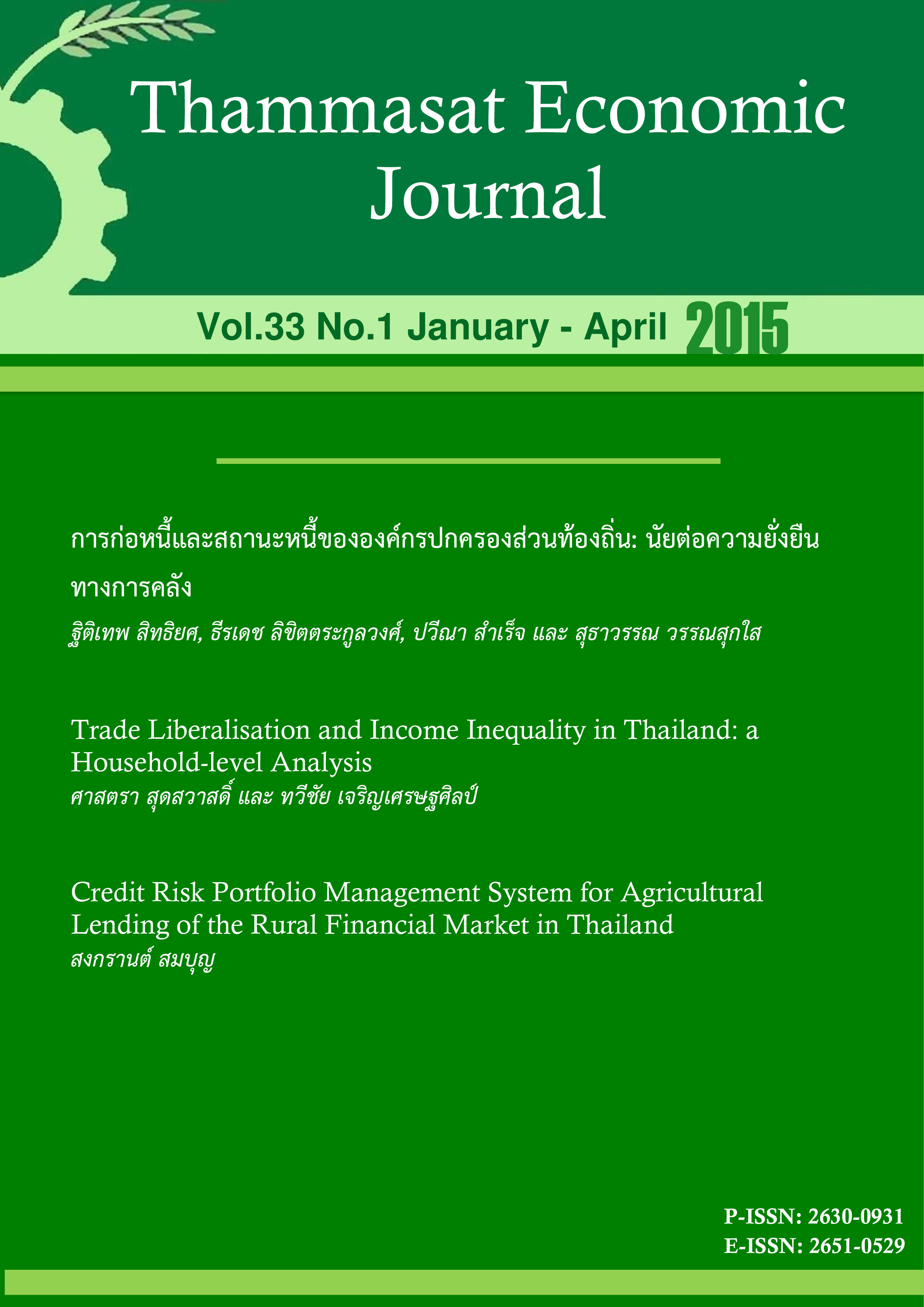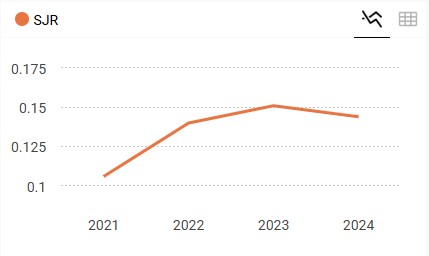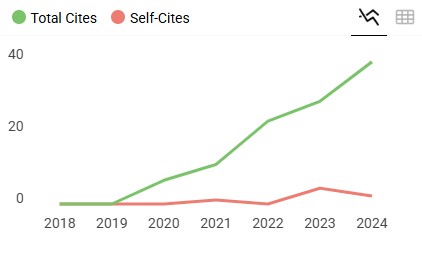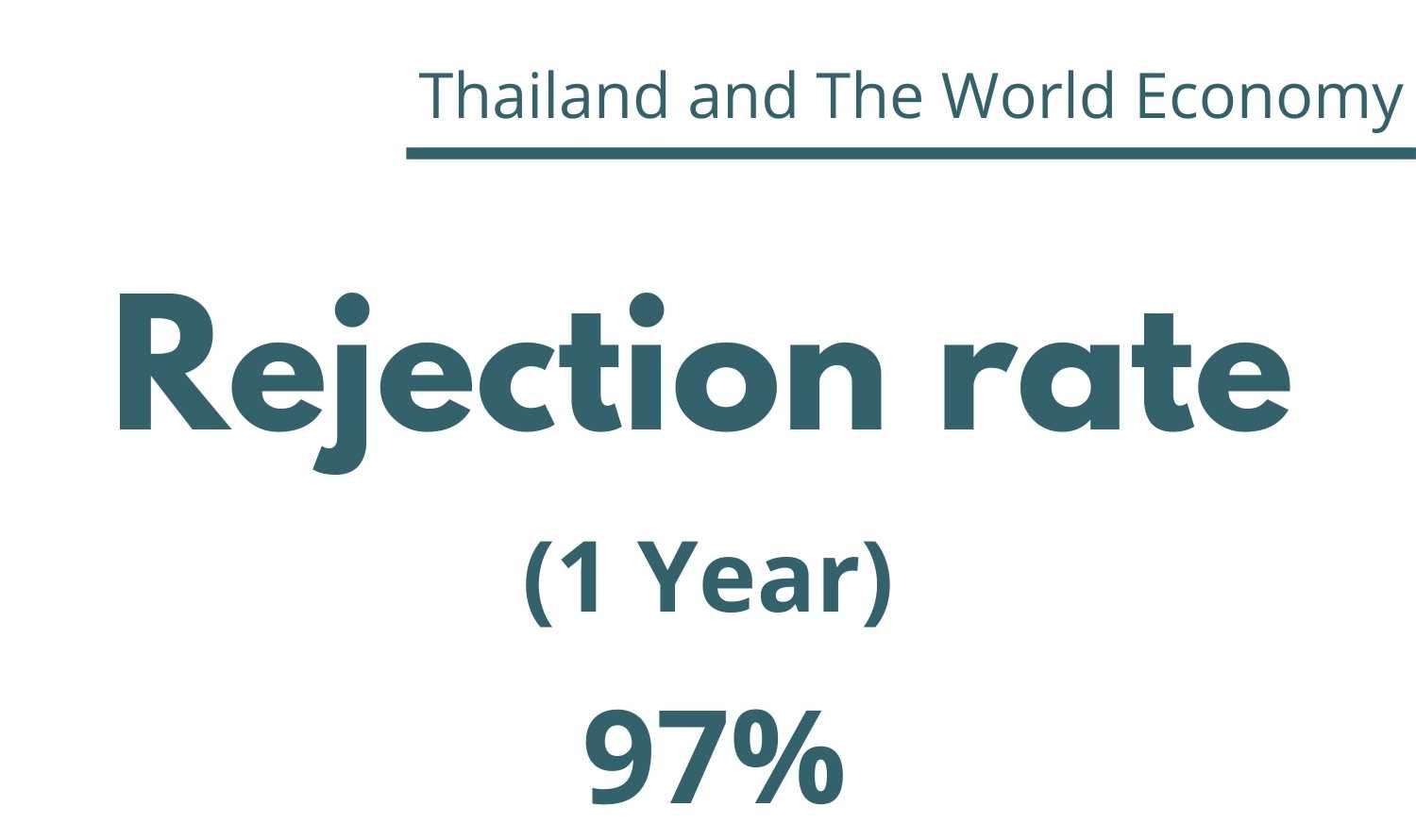Trade Liberalisation and Income Inequality in Thailand: a Household-level Analysis
Abstract
This study examines the effects of trade liberalisation on the levels of household income, consumption, and income in equality in Thailand, by linking the Global Trade Analysis Project (GTAP) based computable general equilibrium model with the Thai Household Socio-Economic Survey (SES) data. The findings indicate that trade liberalisation can both increase and decrease income inequality in Thailand depending on the type of trade liberalisation. If trade liberalisation can increase productivity in the agricultural sector or reduce non-tariff barriers in the service sector in Thailand, it will help to reduce income inequality. In addition, if trade liberalization leads to productivity improvements in manufacturing and service sectors in Thailand’s trading partners or reduces tariff and non-tariff barriers on agricultural products imported from Thailand, it will also lower the level of income inequality in Thailand.
References
2. Akapaiboon, Natta, 2010, “Trade Liberalization, Poverty and Income Distribution in Thailand: A Computable General Equilibrium-Microsimulation Analysis,” Ph.D. Thesis, Department of Economics, University of North Carolina at Chapel Hill, Chapel Hill.
3. Anderton, Bob and Brenton, Paul, 1998, “Outsourcing and Low-Skilled Workers in the U.K.,”CSGR Working Paper No. 12/98, available at https://ssrn.com/abstract=146964.
4. Arbache, Jorge Saba, Dickerson, Andy, and Green, Francis, 2004, “Trade Liberalisation and Wages in Developing Countries,” Economic Journal, Vol. 114, pp. 73-96.
5. Berman, Eri, Bound, John, and Machin, Stephen, 1998, “Implications of Skill-Biased Technological Change: International Evidence,” Quarterly Journal of Economics, Vol. 113, pp. 1245-1279.
6. Feenstra, Robert C. and Hanson, Gordon H., 1996, “Globalization, Outsourcing, and Wage in equality,” American Economic Review, Vol. 86(2), pp. 240-245.
7. Feenstra, Robert C. and Hanson, Gordon H., 2001, “Global Production Sharing and Rising Inequality: A Survey of Trade and Wages,” NBER Working Paper No. 8372.
8. Goldberg, Pinelopi Koujianou and Pavcnik, Nina, 2007, “Distributional Effects of Globalization in Developing Countries,” Journal of Economic Literature, Vol. 45(1), pp. 39-82.
9. Görg, Holger and Greenaway, David, 2004, “Much Ado about Nothing? Do Domestic Firms Really Benefit from Foreign Direct Investment?” World Bank Research Observer, Vol. 19(2), pp. 171-197.
10. Hanson, Gordon H., and Harrison, Ann, 1999, “Trade Liberalization and Wage in Equality in Mexico,” Industrial and Labor Relations Review, Vol. 52(2), pp. 271-288.
11. Harrison, Ann, 1994, “Productivity, Imperfect Competition and Trade Reform: Theory and Evidence,” Journal of International Economics, Vol. 36, pp. 53–73.
12. Hsieh, Chang-Tai, and Woo, Keong T., 2005, "The Impact of Outsourcing to China on Hong Kong's Labor Market," American Economic Review, Vol. 95(5), pp. 1673-1687.
13. Ho, Lok Sang, Wei, Xiangdong, and Wong, Wai Chung, 2005, “The Effect of Outward Processing Trade on Wage Inequality: the Hong Kong case,” Journal of International Economics, Vol. 67, pp. 241-257.
14. Israngkura, Adis, 2001, “The Impact of Globalisation on Income Distribution and Policy Implications,” Paper to be presented at the 26th FAEA Annual Conference on Poverty and Income Distribution in ASEAN: Status and Policy Measures. Bangkok, Thailand.
15. Lay, Jann, Manopiniwes, Chanin, and Puttanapong, Nattapong, 2011, Macro-Micro Simulations of Shared Growth Strategies in Thailand, World Bank.
16. Kumar, Utsav and Mishra, Prachi, 2008, “Trade Liberalization and Wage Inequality: Evidence from India,” Review of Development Economics, Vol. 12(2), pp. 291-311.
17. Moran, Theodore H., 2007, “How to Investigate the Impact of Foreign Direct Investment on Development and Use the Results to Guide Policy,” Brookings Trade Forum 2007, MD: Project MUSE.
18. Pavcnik, Nina, 2002, “Trade Liberalization, Exit and Productivity Improvements: Evidence from Chilean Plants,” Review of Economic Studies, Vol. 69, pp. 245–76.
19. Pholphirul, Piriya, 2009, “The Impact of AFTA on Wage, Employment, and Income Distribution in Thailand: A Computable General Equilibrium Model,” NIDA Development Journal, Vol.49, pp. 1-22.
20. Porto, Guido, G., 2006, “Using Survey Data to assess the Distributional Effects of Trade Policy,” Journal of International Economics, Vol. 70, pp. 140–160.
21. Robbins, Donald J., 1996, “HOS Hits Facts: Facts Win; Evidence on Trade and Wages in the Developing World,” Development Discussion Paper No. 557, Harvard Institute for International Development, Harvard University.
22. Robbins, Donald J. and Gindling T. H., 1999, “Trade Liberalization and the Relative Wages for More-Skilled Workers in Costa Rica,” Review of Development Economics, Vol. 3(2), pp. 140–154.
23. Sangkaew, Piyapong, 2013, “Trade Liberalisation, Labour Productivity and Wage Inequality: The Case of the Thai Manufacturing Sector,” PhD Thesis, School of Economics, University of Wollongong. Retrieved from https://ro.uow.edu.au/cgi/viewcontent.cgi?article=4967&context=theses
24. Winters, L. Alan, 2002, “Trade Liberalisation and Poverty: What are the Links?” World Economy, Vol. 25(9), pp. 1339-1367.
25. World Trade Organization (WTO), 2012, A Practical Guide to Trade Policy Analysis, available at https://vi.unctad.org/tpa/










